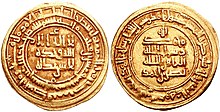Nasr II of Samanid
| Nasr II | |
|---|---|
| Emir of the Samanids | |

Coin of Nasr II, minted in Nishapur, 933/4.
|
|
| Reign | 12 January 914 – 943 |
| Predecessor | Ahmad Samani |
| Successor | Nuh I |
| Born | 906 Bukhara |
| Died | 6 April 943 (aged 38) |
| Issue | Nuh I |
| House | Samanid dynasty |
| Father | Ahmad Samani |
| Religion | Sunni Islam |
Nasr II (Persian: نصر), nicknamed "the Fortunate", was the ruler (amir) of Transoxiana and Khurasan as the head of the Samanid dynasty from 914 to 943. His reign marked the high point of the Samanid dynasty's fortunes. He was the son of Ahmad ibn Isma’il.
Nasr became amir at the age of eight following his father’s assassination in January of 914. Due to his youth, his prime minister Abu Abdallah al-Jayhani undertook the regency. Almost immediately a series of revolts broke out within the state, the most serious being the one led by his great-uncle Ishaq ibn Ahmad. Ishaq’s sons took part in the rebellion; one son, Abu Salih Mansur, took control of Nishapur and several other cities in Khurasan. Eventually, Ishaq was captured, while Abu Salih Mansur died in Nishapur.
Nasr’s ascension also brought instability to the peripheries of the Samanid state. The Abbasids managed to recover Sistan for the last time, while Ray and Tabaristan were taken by the Alid Hasan al-Utrush. Despite being unable to recover the provinces, the Samanids employed numerous local Dailamite and Gilite leaders and remained active in the struggles there.
In 919, the governor of Khurasan, Husayn ibn Ali Marvarrudhi, rebelled against Samanid authority. Nasr responded by sending an army under Ahmad ibn Sahl to suppress the rebellion, which the latter managed to accomplish. After a few weeks, however, Ahmad shortly rebelled himself at Nishapur, made incursions into the Samanid city of Gurgan, and then fortified himself in Merv to avoid a Samanid counter-attack. Nevertheless, the Samanid general Hamuya ibn Ali managed to lure Ahmad out of Merv, and defeated him in a battle at Marw al-Rudh. Ahmad was captured during the battle and imprisoned in Bukhara, where he remained until his death in 920. In 921, the Zaydids under the Dailamite general Lili ibn al-Nu'man invaded Khorasan, but were defeated by the Simjurid general Simjur al-Dawati.
...
Wikipedia
